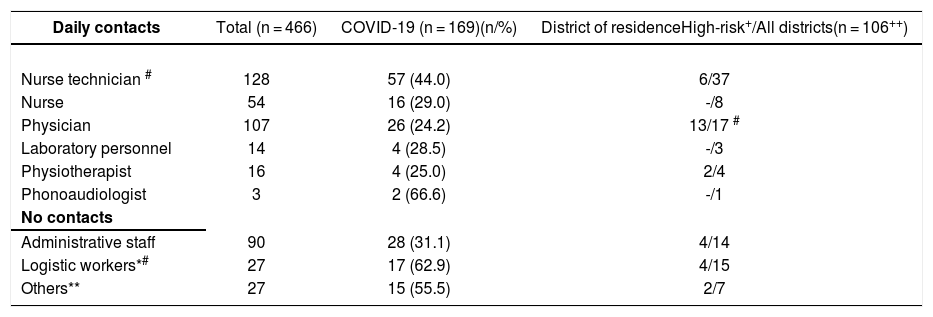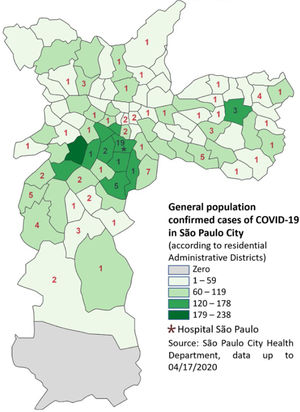Health care workers (HCW) are at a higher risk of being infected in their workplace. Out of a total of 466 HCW of Hospital São Paulo with influenza-like illnesses or any clinical suspicion of COVID-19 were tested for COVID-19 by RT-PCR for SARS-CoV-2 169 (36%) turned out positive and were analyzed by type of exposure and hospital occupation. Data of HCW household locations were also obtained. Logistic workers had the highest positivity rate for SARS-CoV-2 (p = 0.002), while nurse technicians had the highest rate among those reporting routine contacts with patients (p = 0.001). Physicians presented the lowest rate of infection, although living in most affected districts (p < 0.001). Policies and adequate training for all hospital employees may improve prevention of COVID-19 among all health care service categories.
On March 11th, WHO declared COVID-19 as a pandemic. Two days after, the first case of COVID-19 was confirmed at Hospital São Paulo, a large university hospital in São Paulo city. On March 23rd, a quarantine was declared by the local authorities.1Despite social distancing measures, SARS-CoV-2 infections increased in many metropolitan areas.
Health care workers (HCW) are at a higher risk of being infected in their workplace and at the community level as the outbreak expands in urban areas. We diagnosed COVID-19 among HCW and analyzed their type of exposure and household location in the city.2
From March 22nd to April 22nd, during the quarantine in the city, HCW from Hospital São Paulo presenting with influenza-like illnesses or any clinical suspicion of COVID-19 were evaluated at the HCW Medical Assistance Service as part of a routine surveillance after the pandemic was declared. Of note, 144 patients were hospitalized with a COVID19 diagnosis during this period.
Nasopharyngeal swabs were collected, immediately transported to the virology laboratory, and were tested by a specific polymerase chain reaction method for SARS-CoV-2 according to the CDC USA protocol.
HCW were categorized based on the type of exposure to patients (daily contact or not) and the hospital job occupation. Logistic workers included laundry, cleaning services, and security staff. Data regarding the HCW’ household locations were also obtained and analyzed according the residential administrative districts. Fig. 1 shows the general population of confirmed COVID-19 cases in São Paulo city, and the green areas with 120–238 cases were considered the most affected, having the highest risk of SARS-COV-2 transmission.
Statistical analysis: Student t-test, contingency table analysis calculated using chi-square or Fisher’s exact test was used, and a p-value <0.05 was considered statistically significant.
A total of 466 swabs for COVID-19 were analyzed, and 36% (n = 169) were Positive for SARS-CoV-2. The median age was 39.2 years and 71.8% were females (335/466). The positivity rate of each category according to exposure and job description is shown in Table 1.
Health care workers’ type of exposure and city district of residence diagnosed with COVID-19 at Hospital São Paulo.
| Daily contacts | Total (n = 466) | COVID-19 (n = 169)(n/%) | District of residenceHigh-risk+/All districts(n = 106++) |
|---|---|---|---|
| Nurse technician # | 128 | 57 (44.0) | 6/37 |
| Nurse | 54 | 16 (29.0) | -/8 |
| Physician | 107 | 26 (24.2) | 13/17 # |
| Laboratory personnel | 14 | 4 (28.5) | -/3 |
| Physiotherapist | 16 | 4 (25.0) | 2/4 |
| Phonoaudiologist | 3 | 2 (66.6) | -/1 |
| No contacts | |||
| Administrative staff | 90 | 28 (31.1) | 4/14 |
| Logistic workers*# | 27 | 17 (62.9) | 4/15 |
| Others** | 27 | 15 (55.5) | 2/7 |
High-risk: districts with 120-178 and 179-238 confirmed COVID-19 cases ( up to 04/17/2020) ++ Information on district of residence was not available for 60 COVID-19 cases.
Logistic workers had the highest rate of SARS-CoV-2 infection (p = 0,0029), but nurse technicians had the highest rate among those reporting daily contact with patients (p = 0.0010).
We also analyzed the household geographic distribution of the HCW positive cases in the administrative districts of São Paulo. Fig. 1 shows different COVID-19 rates in the general population according to the City Health Office data distributed in the city and also the 106 out of 126 HCW positive cases distributed by household locations.3 Nineteen of these HCW lived near the hospital’s neighborhood, the most affected district by the outbreak. The available location of 106 HCW diagnosed with COVID-19 and their household locations are presented in Table 1. Doctors presented the lowest rate of infection although living in most affected districts (p < 0.001).
COVID-19 transmission among HCW is a common fact; China, Spain, and the USA have also observed a great number of affected HCW.4,5 Our COVID-19 study was conducted in a university hospital of a district in São Paulo with a high rate of confirmed cases during the quarantine.
Considering routine daily contact, nurse technicians were infected the most, probably due to many opportunities for exposure during their shift, although they had received training on the use of personal protective equipment. Unexpectedly, we found that the highest rate of infection was among personnel who had no direct patient contact. Logistic workers were less trained and/or unaware of the risks of COVID-19 transmission at the hospital. Quite often, administrative technicians and logistic workers are not provided with adequate training and personal protective equipment. In this sense, it is essential to implement health policies for professionals who do not have routine contact with patients.
Infection of HCW in the community cannot be ruled out, since many HCW live in high affected districts and many of the positive cases live in the hospital’s neighborhood. Liu et al. in their study about the aerodynamics of SARS-CoV-2 reported high levels of airborne RNA in areas prone to crowding, probably due to infected carriers in the crowd.6 However, logistic workers’ household locations were not significantly associated with the most affected COVID-19 districts (p > 0.05).
Limitations of this study include small sample size, short study time frame, and lack of some HCW data. Facilitating testing of symptomatic professionals, creating sick leave policies that are non-punitive, flexible, and consistent with public health guidance, and providing adequate training and protective equipment could improve the prevention of infection transmission to employees.
Conflicts of interestThe authors declare no conflicts of interest.








